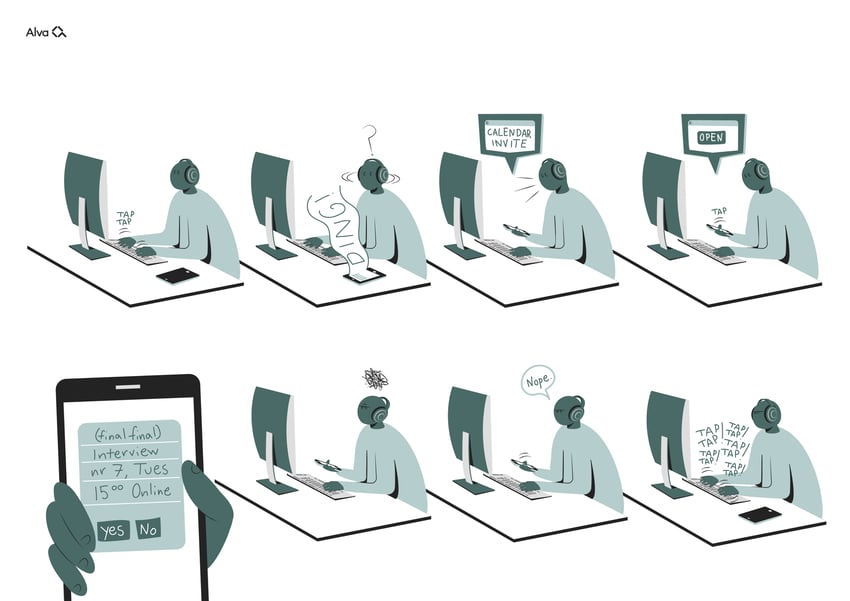Here's our bulletproof guide to the best tools for talent acquisition out there to help you and your people find, nurture, hire, onboard, and retain the best people.
Employer Branding & Communication Tools
72% of recruiting leaders say that employer branding has a significant impact on their hiring, helping them to find top performing talent and unify their presence across social media, web and consumer-facing brands. Use a tool like Notion to create a super simple, saveable page that candidates can store and use to tailor their application.
Applicant-Tracking System (ATS)
Use an ATS that creates a micro-site on your homepage, enabling you to maintain your employer brand and communicate your benefits. Timely communication is essential to nurturing your talent funnel and reducing leaks, so make sure your ATS provider enables automated email flows so your candidates receive timely updates on the status of their application, reducing Time to Hire and associated costs.
For our ATS, we use the amazing Teamtailor.
Screening
If you're still asking candidates to have a certain number of years experience, ask yourself why. Experts on personality psychology in recruitment, Frank L. Schmidt and John E. Hunter, found that looking at past experience is as predictive of future success as assessing someone's handwriting (spoiler alert: it's useless).
The World Economic Forum estimates that 40 percent of today's job skills will change in just five years; CHRO of Swedish cosmetic giant Lyko, Moa Wictorén, told us, "The only thing you can be sure of is that the job you're hiring for will be something else in the near future."
Invest in HR software that allows you to understand which candidates are going to be right today and for how you evolve; make sure that any recruitment tool you use doesn't automate bias - by using an ATS bot, you could still be screening out the 30% of women and 50% of People of Colour who struggle to get a first interview. At Alva, we have developed psychometric assessments that are based on science. They help you assess both personality and logical ability, as well as helping you to reduce bias, scale with ease and allows you to find candidates who have the potential you need.
(And hey, we've also baked in automatic feedback for candidates, so everyones gets immediate, evidence-based and informative feedback. Double win!)
Interviewing & case studies
A structured interview process based on Situational Behaviour and Past Situation response questions are the most effective ways to understand who has the potential to be the best candidate for your position. At Alva, we help our partners to develop their interviewing strategy and techniques so they are always aiming for the most accurate match of person to role.
When you hire people for potential rather than for a list of fancy universities or a list of past employers, you need HR tools to help you to understand if they're the right fit for your post. In service and creative roles, we can understand this through situational based interviewing, case studies and portfolios. We don't demand that candidates have specific proficiencies as these can be learned by candidates who have the right potential. For practical tech and engineering skills, we use Devskills.
Background checks
We're of the opinion that reference checks don't add much validity: they're super-subjective, sometimes past employers can be unfair about a candidate, and, you know, sometimes people even write their own (I know, I've written some of my own). If you do want to use background check, try RefApp!
Background checks make sure we know who we're hiring and if there are any issues we need to know about. Make sure that any third-party checker is legally compliant with the candidate's base. We use a local Swedish service, backgrundskollen.se as we know it's compliant with our employment law. Other great interfaces are Intelifi
Quick contracts
Stop using clunky pdfs that people print, sign, scan or - even worse - photograph & email back. Save time and money by working with a great SaaS provider; we use pocketlaw and scrive to automate and simplify contracts.
Onboarding
With covid-era hires leaving more rapidly, citing fully online onboarding, a hybrid model will continue to be best practice. Use a provider who sees the strategic potential of onboarding. Whippy see onboarding as a structured, evolving journey. Their three pillars to structure a successful, cost-effective onboarding are:
- Have a clear purpose
- Link back to organisational needs
- Have measurable impacts
By framing onboarding as having specific, strategic goals, HR teams can more easily collaborate with managers and employees to uncover insights. Create a hybrid, measurable system with recruitment tools that helps you to understand who's performing well, where people need help and how to measure success.
The right HR tools depends on your organisation
When your team is fewer than 10 people, you get so much shared organisational knowledge for free. Once you move up to 20 employees, founders understandably start to struggle. There are too many people to work in the hands-off, policy-lite ways of early stage startups.
As you start to scale, look ahead at the potential blockers you can see - communicating with candidates, seamless contracts or bias-free screening at scale - and find the best HR tool to get ahead of the blocker. Partner with companies who will help you to build processes and bring their expertise to the table. Leave it too long and, as Aaron Dignan says, you're building in organisational debt.
The one thing that won't change is the rapid pace of start-up life. At Sifted, HR leaders estimated that CEO involvement in hiring remains constant - building leads, looking ahead for talent to secure at each funding round for smooth and systemic growth. Build your teams and partner with SaaS providers and HR automation tools who can help you find those brilliant people, quickly, efficiently, and reduce bias in your hiring.






